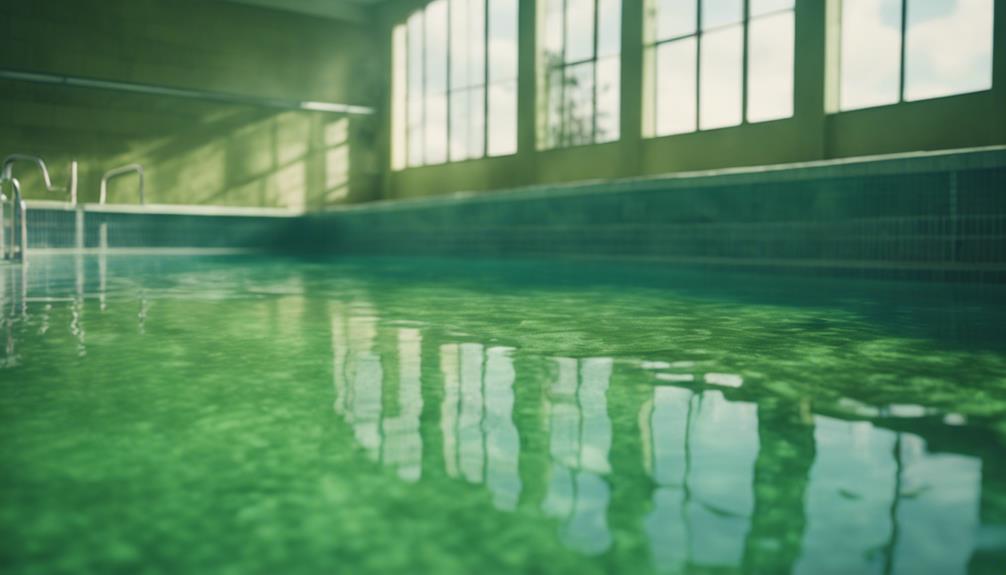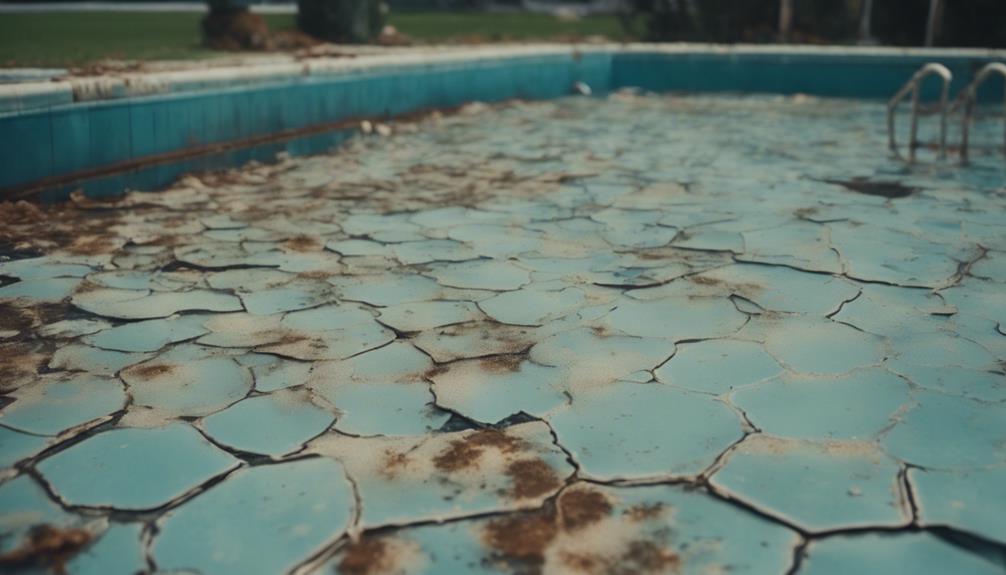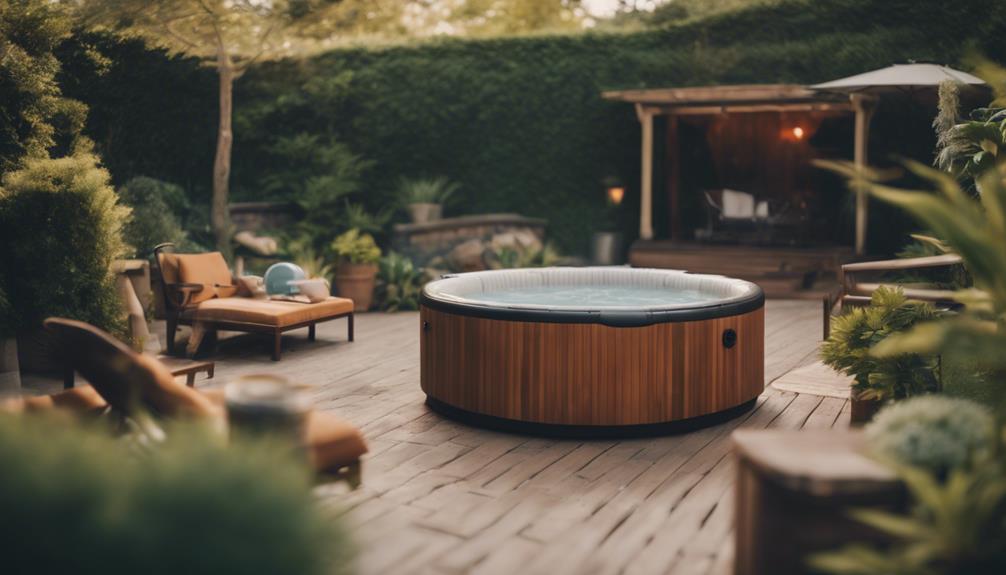To determine if your swimming pool needs restoration, watch for structural cracks, which can worsen if ignored, affecting safety. Surface wear, like roughness, must be attended to keep the pool safe and attractive. Poor water quality signals chemical or filtration problems, requiring testing and balancing. Equipment issues, like irregular flow or leaks, affect water quality and efficiency, needing immediate attention. Modernizing enhances aesthetics and functionality, making vintage pools feel outdated. Recognizing these signs can help maintain a pristine pool environment.
Key Takeaways
- Structural cracks indicate underlying issues, requiring prompt attention to prevent further damage.
- Surface wear like rough textures or peeling plaster can compromise safety and aesthetics.
- Murky or discolored water signals chemical imbalances, necessitating water quality restoration.
- Malfunctioning equipment leads to poor water quality and inefficiencies, warranting immediate repair.
- Modernizing enhances pool appeal and functionality, offering a better swimming experience.
Structural Cracks
Structural cracks in a swimming pool's deck or interior are indicators that restoration may be necessary to address potential underlying structural issues.
While some cracks may be superficial, others can signal more severe problems that require immediate attention from professional pool companies. Neglecting these cracks can lead to exacerbated damage over time, impacting the pool's integrity.
It is important to have these cracks assessed and repaired promptly to prevent any further deterioration. Replastering the pool is a common solution to address unsightly cracks and maintain the pool's structural integrity.
Surface Wear
Addressing surface wear is essential for maintaining a safe and enjoyable swimming pool environment, especially as eroding pool surfaces can pose risks to swimmers.
Resurfacing involves removing old plaster and applying a fresh coat for a smooth finish.
Rough pool surfaces can be hazardous and detract from the swimming experience.
A pool remodel can create a safe and enjoyable environment for everyone.
Regular maintenance can prevent surface deterioration.
Proper surface care enhances the aesthetics and longevity of the pool, ensuring a pleasant swimming experience for all users.
Water Quality

Effective management of water quality is paramount for maintaining a safe and enjoyable swimming pool environment. Murky or discolored pool water indicates problems with chemical balance and filtration. Environmental factors and imbalanced chemicals can lead to poor water quality. Testing water, balancing chemicals, and inspecting filtration systems can help improve water clarity. Professional assistance may be needed if water quality issues persist. Restoring water clarity enhances the overall pool experience.
| Water Quality Issues | Solutions |
|---|---|
| Murky or discolored pool water | Test water and balance chemicals |
| Imbalanced chemicals | Inspect filtration systems |
| Poor water quality | Seek professional assistance |
| Persistent issues | Restore water clarity |
Equipment Malfunctions
Proper maintenance of pool equipment is essential to guarantee excellent water quality and efficient operation of the swimming pool. When equipment malfunctions occur, it can lead to subpar water conditions and increased operational costs.
Here are five signs that your pool equipment may be in need of restoration:
- Irregular water flow or inadequate circulation
- Unusual noises or vibrations coming from the pump or filter
- Inconsistent water temperature despite proper settings
- Visible leaks or moisture accumulation around the equipment
- High energy bills without a clear explanation
Addressing equipment malfunctions promptly through restoration can not only improve water quality but also secure a smooth and cost-effective pool operation.
Modernization & Aesthetics

Enhancing the visual allure and functionality of a swimming pool through modernization is a significant consideration for pool owners seeking to elevate their aquatic experience. Vintage pools may lack the modern features and aesthetics that many individuals desire.
Upgrading the pool design, incorporating new tiles, or adding contemporary features can greatly enhance the pool's overall appeal and functionality. Vintage pools might not offer the same level of enjoyment or efficiency as modern pools, making restoration a worthwhile investment.
Frequently Asked Questions
Can Restoring My Swimming Pool Increase the Value of My Property?
Restoring your swimming pool can greatly enhance the value of your property. A well-maintained and aesthetically pleasing pool enhances the overall appeal of your home, attracting potential buyers and potentially leading to a higher selling price.
How Often Should I Have My Pool Equipment Inspected for Malfunctions?
Regularly inspecting pool equipment is essential for maintenance. Monitoring filters, pumps, and heaters should occur at least once a year, but more frequent checks are advisable for peak performance. Timely inspections prevent malfunctions and guarantee a smoothly running pool.
What Are Some Popular Modern Features I Can Add During Pool Restoration?
When considering pool restoration, popular modern features to enhance your pool include LED lighting for ambiance, saltwater chlorination for a gentler swimming experience, energy-efficient pumps and heaters, automated cleaning systems, and smart technology integration for convenient control.
Will Resurfacing My Pool Help Prevent Injuries to Swimmers?
Resurfacing your pool can indeed help prevent injuries to swimmers. Eroding pool surfaces can cause discomfort and hazards. By removing old plaster and applying a fresh coat, resurfacing creates a smooth finish, ensuring a safe swimming environment.
How Can I Maintain Water Quality in My Pool After Restoration?
Maintaining water quality post-restoration involves regular testing, chemical balancing, and filter inspections. Addressing issues promptly can improve water clarity and guarantee a pleasant swimming experience. Seek professional assistance if persistent problems arise for effective resolution.
Conclusion
To sum up, identifying the signs that indicate the necessity for swimming pool restoration is crucial for upholding a safe and pleasant aquatic environment.
By dealing with:
- Structural cracks
- Surface wear
- Water quality concerns
- Equipment malfunctions
- The wish for modernization and aesthetics
Pool owners can guarantee their pool stays a functional and welcoming area.
Just like a properly-maintained pool improves relaxation and recreation, timely restoration interventions can enhance the overall pool experience.










